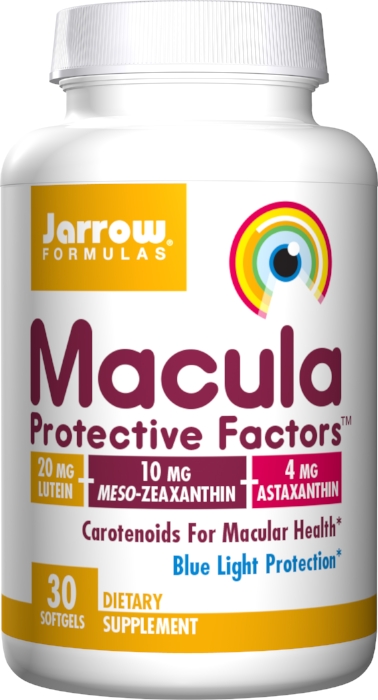Jarrow Formulas has just developed a new eye formula that is one of the only products on the market today to contain meso-zeaxanthin, a unique form of zeaxanthin (a carotenoid- a nutrient related to vitamin A) that is particularly beneficial to eye health. The new formula called Macula Protective Factors, and we’re very excited to have it in the store.
Meso-zeaxanthin helps to increase pigment density in the center of the macula, which almost works like natural protective sunglasses in the eye.
Lutein is probably the best known eye supplement. Part of how lutein protects the eye is by increasing pigment density in the eye, though research has discovered that lutein primarily works on the periphery or outer side of the macula, whereas meso-zeaxanthin works in the center of the macula- where the most damage is done to our eyes. Meso-zeaxanthin has documented benefits not found in other forms of zeaxanthin or other eye supplements.
Meso-zeaxanthin is not found in foods, and while supplements where simply “zeaxanthin” is listed on the label may possibly contain some percentage of meso-zeaxanthin, there is no way of knowing exactly how much.
Interestingly, when we first received a prototype of this new supplement by Jarrow, Margot (who works at the store) started taking it and brought it to show to her eye doctor. When he saw the ingredients, specifically that it contained the rare form of meso-xeaxanthin, he was extremely excited and wanted more information about the supplement, since he knew the benefits of meso-xeaxanthin, but said it was usually hard to find.
Part of the uniqueness of meso-xeaxanthin is that unlike regular zeaxanthin supplements or other eye nutrients, it is able to cross the blood/retina barrier, and as such, is able to directly benefit and protect the eyes from damage. In studies, supplementation with meso-xeaxanthin led to the largest increases in macular pigment densities, which is the first defense for the eyes against radiation and the damaging blue light emitted from electronic devices.
Macular degeneration is the leading cause of vision loss for people aged 60 and older. It is an irreversible destruction of the macula, which leads to a loss of detailed “straight ahead” vision needed for reading, driving, and other daily activities. Unfortunately, nothing yet has been found to restore damage to the macula, so protecting the eyes and mitigating damage is paramount.
Increasing macular pigment density helps to prevent age related macular degeneration, and the specific form of meso-zeaxanthin has been conclusively shown to increase that pigment density, especially in the center of the eye. Increasing macular pigment in the eye helps to naturally absorb damaging UV and blue light, reducing oxidative stress on the eye. Meso-zeaxanthin helps to neutralize the reactive, oxidative free radicals created by exposure to UV and blue light.
The amount of macular pigments we naturally have decreases with age, which in turn gives our eyes less protection as the years go by. Also, people with light eyes naturally have less pigment density in their eyes, and because of that, their eyes are less effective at absorbing environmental radiation and protecting the retina.
Without hesitation, we would say that this new Macula Protective Factors by Jarrow is hands down the best eye supplement we have ever seen. It’s an exciting new advancement that I’m really happy to be able to share. In addition to containing the amazing meso-zeaxanthin, this new formula also contains lutein plus astaxanthin, a broad spectrum antioxidant that is active in the eyes (not all antioxidants are).
Eye health, and preventing the degradation of the eyes that nearly all of us will experience with time, is extremely important and directly affects one’s daily life and standard of living. In the past, most people would only begin to start thinking about eye health around retirement age, but new research is showing how eye nutrients can be beneficial and protective to people of all ages, even children and teenagers, who are exposed to damaging blue light from electronic devices and screens more now than ever before.
We will be offering Jarrow’s new Macula Protective Factors on sale at Pass Health Foods through the month of September for 25% off, so it’s a great time to try it.


